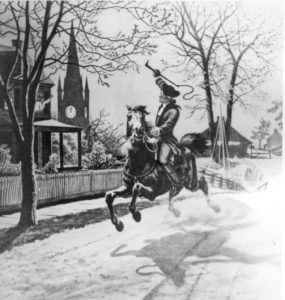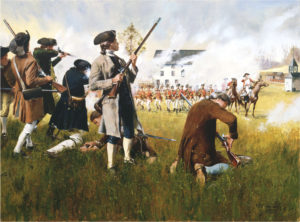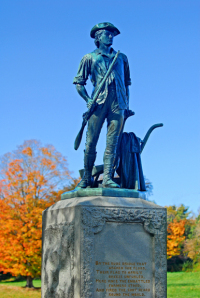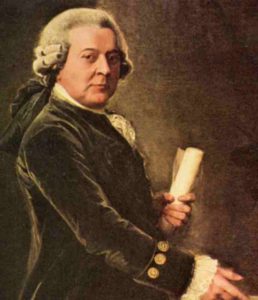Among the innumerable examples of bravery in American history, the events surrounding the first battle of the American Revolution are prominent. Massachusetts was under martial law; Boston was ruled by a British general. A shadow government of sorts had been set up by those who were opposed to how the Mother Country was tightening her screws of control.
The two leaders of the resistance, Samuel Adams and John Hancock, were in the small village of Lexington, planning their passage to Philadelphia to be part of the Continental Congress. On the night of 19 April 1775, British regulars were dispatched from Boston with two purposes: capture Adams and Hancock for trial (and execution) in Britain; remove all the colony’s store of guns and ammunition in Concord.
Neither objective was achieved.
 Riders went out from Boston to alert the countryside. The best-known one, of course, was Paul Revere. No, he didn’t shout “The British are coming!” That would have been a redundancy—they were all still British. His message was that the “regulars” were coming out, which was a fearful matter. These were highly disciplined troops.
Riders went out from Boston to alert the countryside. The best-known one, of course, was Paul Revere. No, he didn’t shout “The British are coming!” That would have been a redundancy—they were all still British. His message was that the “regulars” were coming out, which was a fearful matter. These were highly disciplined troops.
What did the colonists have to stand against them? Only farmers and shopkeepers, the local militia that had recently taken the name of Minutemen, since they had to be ready at a minute’s notice should an attack come.
 Adams and Hancock escaped from Lexington just in time. The 700 regulars arrived to face a small contingent of Minutemen on Lexington green. There was never an intent on either side to have a pitched battle. Seventy townsmen facing 700 regulars would have been folly. They were simply making a statement. When ordered to leave the field, they were in the process of doing so.
Adams and Hancock escaped from Lexington just in time. The 700 regulars arrived to face a small contingent of Minutemen on Lexington green. There was never an intent on either side to have a pitched battle. Seventy townsmen facing 700 regulars would have been folly. They were simply making a statement. When ordered to leave the field, they were in the process of doing so.
Then a shot rang out. Accounts differ as to the source of that shot. Ralph Waldo Emerson, in a poem, later referred to it as “The Shot Heard Round the World.”
Eight Lexington men were killed. And the troops marched on to Concord.
 Concord was ready. All the stores of munitions were removed to safety before the troops arrived. Nervous Concord Minutemen stood by a bridge outside of town. When they saw smoke coming up from the town, they feared the troops were setting fire to their homes. That brought on a battle on the bridge.
Concord was ready. All the stores of munitions were removed to safety before the troops arrived. Nervous Concord Minutemen stood by a bridge outside of town. When they saw smoke coming up from the town, they feared the troops were setting fire to their homes. That brought on a battle on the bridge.
Seeing that their goals were not achieved, the regular troops were ordered back to Boston, but now the entire countryside was up in arms—literally. That march back to Boston turned into a rout, as colonists, fighting in Indian manner, would shoot at them from behind hedges, trees, and fences, then run ahead to do the same again when the troops reached them in their new location.
Once the troops were back in Boston, 15,000 Massachusetts militia formed a ring around the city, to ensure they would not be attacked again.
Lexington and Concord signaled the opening of the war for independence.
 John Adams, writing to wife Abigail about what had occurred, penned some memorable words:
John Adams, writing to wife Abigail about what had occurred, penned some memorable words:
Posterity! You will never know how much it cost the present Generation to preserve your Freedom! I hope you will make a good use of it. If you do not, I shall repent in Heaven that I ever took half the pains to preserve it.
What of Adams’s words today? Have we done a good job of preserving what he and others of that Founding generation did to deliver freedom to us? Time will tell.
